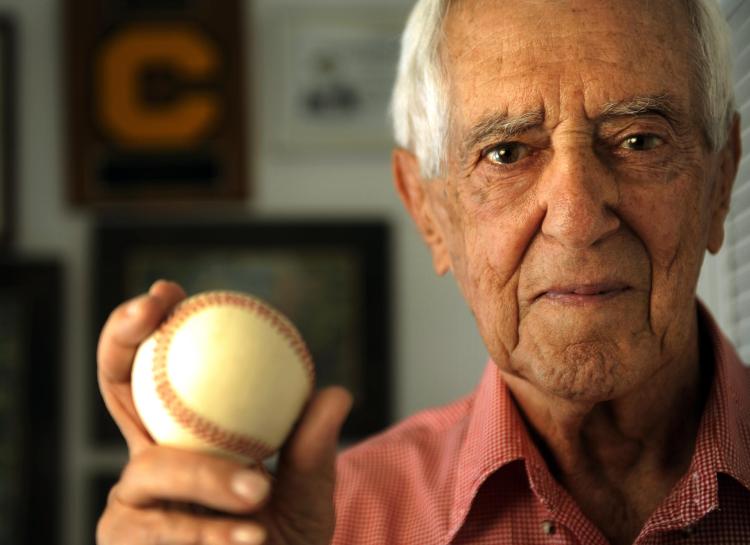And for 72 years, Martin and Gloria Trotsky have been generously grateful to CU Boulder

Martin Trotsky in the early 1940s. Photo courtesy of CU archives.
Martin Trotsky came to the University of Colorado Boulder to play baseball and earn a college degree. He knew so little about where he was heading, he thought Boulder was home to Boulder Dam, now called Hoover Dam. He had yet to develop a fondness, let alone loyalty, to the university.
That was 1938. He was 20. During his first year, when he was subsisting on $15 a month, spaghetti and skim milk, he considered dropping out and returning home to the East Coast.
But here he found kindness from CU Boulder’s baseball coach and its chief dietician, who helped him survive his freshman year. Here he played shortstop on a CU baseball team that won 25 consecutive games between 1940 and 1942. And here he met Gloria, his wife of 72 years.
Martin and Gloria supported the university each and every year since 1942—the year he graduated. Today, Martin is 99, Gloria is 95, and their devotion to each other, and CU Boulder, seems only to have grown.
“After 75 years of contributions, we still feel honored to be graduates of the university, and we learned a lot there, both academically and socially,” Martin Trotsky said recently. “We feel very, very close to the university, and I hope the university feels close to both of us.”
Paul Levitt, a professor emeritus of English whose writing program Martin and Gloria Trotsky have long supported, said the feeling is mutual, calling the couple “wonderful people” who are “enormously generous.”
A child of the Great Depression, Trotsky grew up in New Haven, Conn., and hoped to attend his hometown institution, Yale University. But at $450 a year, the cost was an “economic impossibility.”
After graduating high school in 1935, he played semi-pro baseball for three years, making $2 or $3 a game, until his athletic skills caught the eye of CU Boulder Coach Harry Carlson, who invited Martin Trotsky and two of his chums to CU.
Coach Carlson told the young men to come with $200 each, and “he’d see that we got through school, as long as we made our grades,” Martin Trotsky noted.
Once here, however, the students found it tough going. Each had a job through the National Youth Administration, a New Deal program, that paid $15 a month.
“It was a far cry from what we expected, and at one point early in my freshman year, I thought seriously about transferring to another school, because it was very difficult to get along [financially],” Martin Trotsky recalled.
Nonetheless, the young men invited Carlson and former CU football standout Kayo Lam to dinner at their apartment. Carlson and Lam were served “our normal course of spaghetti and skim milk.”

Gloria and Martin Trotsky in a recent photograph. Photo courtesy of Gloria and Martin Trotsky.
Skim milk was 10 cents a gallon, and spaghetti was cheap. “So, we had a lot of skim milk, and we ate a lot of spaghetti”—with no sauce.
A few days after the dinner, Carlson told Trotsky to speak to Bly Curtis, CU’s chief dietician and director of the women’s dormitory of the time, now called Sewall Hall. Curtis told Trotsky to “get a large pot” to take to the women’s dorm, which gave the young men the dorm kitchen’s leftovers.
“It was like manna from heaven,” Martin Trotsky said.
Levitt emphasizes the deeply positive effect of Carlson and Curtis, which continues to this day: “He adores both of them. He has good reason to adore both of them.”
Carlson admired Martin Trotsky as well. In 1946, he told The Denver Post, “No one who ever played shortstop at CU compared to Marty Trotsky, who scintillated in that position in 1941 and 1942.”

Martin Trotsky posed with a baseball at his Denver home in 2011, when he was 93. Trotsky played baseball and basketball for CU. He was a shortstop that was on the team that won 25 games in a row. Photo credit: The Denver Post/Getty Images
During his sophomore year, the baseball team began its 25-game winning streak. Fortune smiled in other areas as well:
The young players from Connecticut got a pay increase to $20 a month. Martin Trotsky was pledged to a fraternity, which gave him room and board in exchange for a few odd jobs: “hashing” (chopping food) in the kitchen, stoking the furnace, cutting the lawn and shoveling snow from the sidewalks.
And Gloria met Martin in his junior year, 1941. After he completed his service in the U.S. Marine Corps, they married in December 1944. “It’s been a real romance for 72 years,” Martin Trotsky said.
Martin graduated with a degree from the business school, and Gloria Trotsky earned a bachelor’s in music education.
They settled in Denver, where he became a successful businessman and where the couple still lives. They have two children, four grandchildren and five great-grandchildren.
“As I improved my economic situation, well, then my contributions to the university grew, and we’re very happy to be able to pay back to a school that was so important to both Gloria and me,” he said.
Among the many initiatives they have supported are the Gloria and Martin Trotsky Music Scholarship Fund and the Martin and Gloria Trotsky Writing Scholarship Fund. The Trotskys’ support for the latter fund, administered by Levitt, came about after Martin Trotsky heard Levitt give a presentation in the 1980s about the undergraduate-writing program, which was then being launched.
“We’ve been very fortunate to live this long, and we’ve been very fortunate to be able to support the university in a fashion that we felt was very satisfactory for both ourselves and the university,” he said. “We weren’t million-dollar givers, but we were givers every year.”



